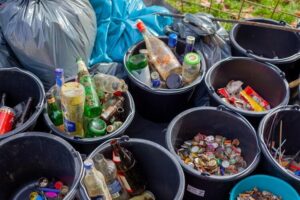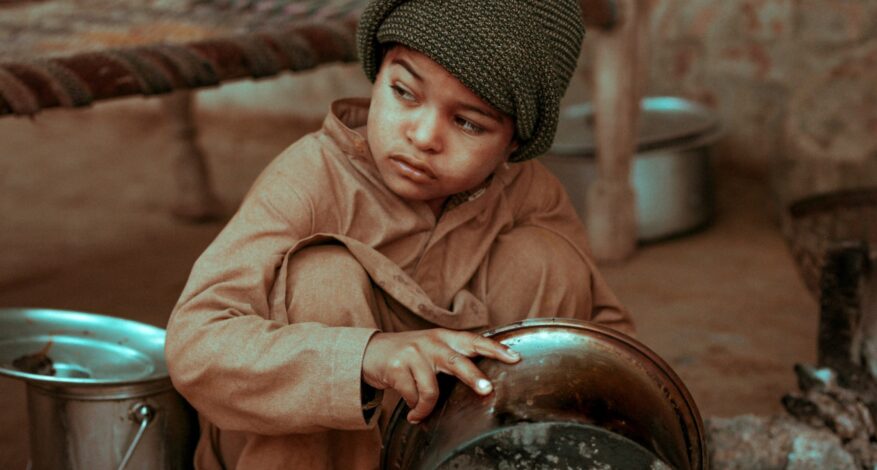WHY AND HOW WE SHOULD ALL FIGHT AGAINST FOOD WASTE
What are food loss and food waste?
Goal 12.3 of the UN Sustainable Development Goals (UNSDGs) is reducing food waste on a global scale. According to a survey by FAO, presented in 2011, although world hunger has been increasing, in fact, an estimated 1/3 of food is lost or goes to waste. Indeed, there is a difference between lost food and wasted food. The former is the one “that is discarded, incinerated or otherwise disposed of along the supply chain from harvest”, excluding the retail level, and “does not re-enter in any other productive utilization”. By contrast, food waste is the amount of food that retailers, food service providers, and consumers discard by the personal decisions/voluntarily.
Why and how we should care for it
 Reducing the amount of food that is lost or wasted every year is not as easy as it may seem. In fact, despite the widely spread awareness that a huge size of the global population suffers hunger, and that the hunger levels are rising, especially during the current pandemic, the data on food loss and waste does not appear to improve. Therefore, reaching this goal requires work that digs deep down into that “throwing away culture” that is so common and well-rooted nowadays in the world. This implies that our approach to food has to change. In particular, people need to learn how to store food in the best way possible, so that it can “survive on the shelves” for a long time before being consumed. Moreover, food suppliers should stop discarding those nutrients that do not look perfect in terms of size, shape, or color. Lastly, the “best before” dates are something that we all need to approach differently if we want to reduce food waste: from reading them when buying food at the supermarket to understanding that the written date does not have to be respected at any cost. Nothing is going to happen if we eat that food a few days later.
Reducing the amount of food that is lost or wasted every year is not as easy as it may seem. In fact, despite the widely spread awareness that a huge size of the global population suffers hunger, and that the hunger levels are rising, especially during the current pandemic, the data on food loss and waste does not appear to improve. Therefore, reaching this goal requires work that digs deep down into that “throwing away culture” that is so common and well-rooted nowadays in the world. This implies that our approach to food has to change. In particular, people need to learn how to store food in the best way possible, so that it can “survive on the shelves” for a long time before being consumed. Moreover, food suppliers should stop discarding those nutrients that do not look perfect in terms of size, shape, or color. Lastly, the “best before” dates are something that we all need to approach differently if we want to reduce food waste: from reading them when buying food at the supermarket to understanding that the written date does not have to be respected at any cost. Nothing is going to happen if we eat that food a few days later.
Tackling these issues and trying to reduce the amount (and value) of food that is lost or wasted every year is fundamental for multiple reasons: it helps to reach the UNSDG number three, which aims at reducing the hunger globally; and it helps fight against climate change, or, better, improve our use of the natural resources of our planet. As FAO points out, in fact, “food that never gets eaten also represents a waste of resources such as land, water, energy, soil, seeds and other inputs used in its production, increasing gas emissions in vain”.
Some hope
However, the situation is not entirely hopeless. As a matter of fact, there are many people who are fighting against these issues, both globally and in Italy.
To start, the UN Food and Agriculture Organization is one of those leading the fight by partnering with many local or international actors that try to raise awareness and consciousness with on-field activities, in order to avoid that data on food waste and food loss keep getting worse.
Furthermore, internationally speaking, many people today use the app “Too good to go”. The goal of this app and of its creators is that of eliminating food waste or reducing it as much as possible. What they do is connect local food shops, restaurants, cafes, bakeries, etc. that, at the end of the day, are available to give unsold food to consumers for less than its original value. For example, through this app, you could buy the unsold bread of your local bakery for much less than what you would normally do (up to 2 or 3€ instead of 15 or 20€, for instance). Thanks to these initiatives, people can save money, help the planet (as we avoid wasting and producing the gas emissions that would otherwise be needed to eliminate that food), and help the food producers to bear the costs of unsold food elimination. The app is quite popular today and it is inspiring and admirable at the same time. It is able to connect a lot of people and it helps fighting food waste and climate change, while offering cheaper meals to consumers and easier waste management to food sellers, at the same time.
A local insight – positive and negative sides
 In Italy, the data concerning food loss and food waste offer no consolation. As a matter of fact, according to the Waste Watcher report 2020, each Italian family wastes 4,9€ per week on average. This is equal to about 6,5€ Billion wasted in total, and, if we include the food waste taking place during the distribution and production processes, the figure increases to about 10€ Billion.
In Italy, the data concerning food loss and food waste offer no consolation. As a matter of fact, according to the Waste Watcher report 2020, each Italian family wastes 4,9€ per week on average. This is equal to about 6,5€ Billion wasted in total, and, if we include the food waste taking place during the distribution and production processes, the figure increases to about 10€ Billion.
Thankfully, however, there are also some local initiatives that fight against these issues. In Italy, the Association “Banco Alimentare” fights both world hunger and food waste. Their work consists mainly of distributing food and meals to poor families. In 2019, thanks to the help of the 21 regional “Banco Alimentare” and of around 7,500 charities, they collected about 75,500 tons of food. Furthermore, they fed 1,5 Million people, who would not have had enough food to survive otherwise. Moreover, economically speaking, all the firms that decide to donate unsold food add an economic value to it and avoid the costs of its disposal by diminishing greenhouse gas emissions, as they do not have to eliminate it. And, in the meantime, they help fight against food loss. The Association is well-known in the country, and once a year, in collaboration with almost all the Italian supermarkets, they promote the “food collection national day”. During this day, every customer of the supermarket can choose to buy some products in the store. Then, these products will be collected by the volunteers of the association and redistribute to families in need.
Because of the contribution they give to monitoring the food waste in Italy, it is worth mentioning the work done by the national official observatory of food waste: Waste Watcher. It was created in 2013, and, since then, it has been fully active in the research, observation, and data collection and in the field of food waste. The observatory has established the national day against food waste, which is celebrated every year on February 5th. This year’s theme of the day was “Stop food waste. One health, one planet.”, and it is the 8th celebration of this day in the country. Due to the current pandemic, there were no public demonstrations, nor events where people could gather together, but, at 11.30 a.m., it was possible to follow an online conference where experts talked about this topic, data were showcased, and inspirational words were pronounced.
Let’s join their work
These initiatives really do have an impact. , That is why it is important we know they exist and we all find our way to join the activities they promote, as well as all those of the other associations working in this field. Besides, everyone should learn how to fight food hunger and food waste by changing their daily habits in their daily lives. In this way, data will gradually improve, and, instead of wasting the “ugly food”, the world will be able to redistribute it better and more equally. This would be ideal, as it would reduce the amount of greenhouse gas emissions, thus helping the health of the planet on one hand, and the health of many on the other, by fighting world hunger.

